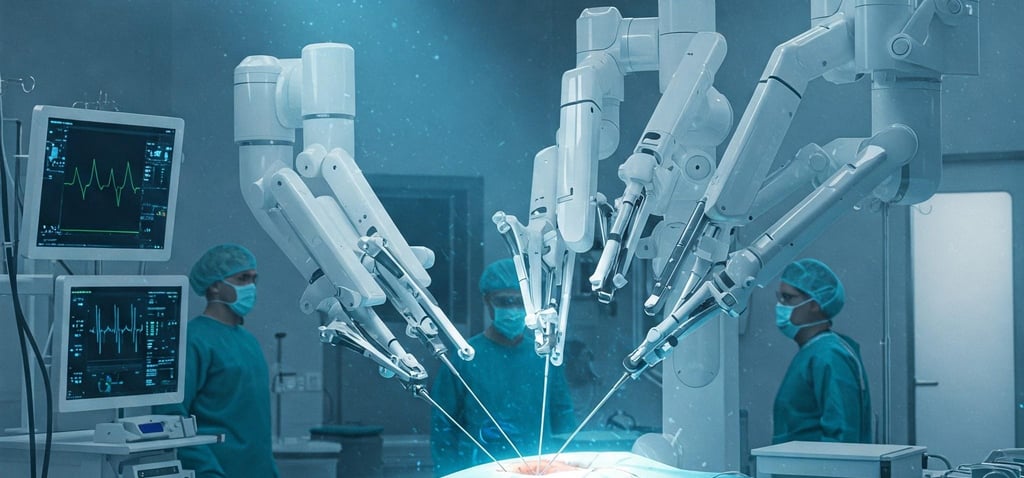The Future of Robotic Surgery: A New Era of Precision and Possibility
Imagine a world where surgery is performed with flawless precision, minimal risk, and near-zero human error. A world where robots diagnose, operate, and even perform post-surgical care with the expertise of the greatest human surgeons combined with the efficiency of artificial intelligence. This is not the plot of a science fiction novel—it is the future of medicine, and it is closer than we think.
3/21/20252 min read


The Rise of Robotic Surgery
Robotic-assisted surgery is not a new concept. Since the early 2000s, systems like the da Vinci Surgical System have allowed surgeons to perform delicate procedures with enhanced precision, stability, and control. These systems act as extensions of the surgeon’s hands, offering magnified vision and greater dexterity. Today, robots assist in complex surgeries such as cardiac bypass, prostate removal, and neurosurgery, drastically reducing recovery time and complications.
However, these systems still require human operation. The next frontier is full autonomy—robots performing surgeries independently, with minimal human supervision.
The Technologies Powering the Future
The path to fully autonomous robotic surgery involves a combination of cutting-edge technologies:
Artificial Intelligence (AI) & Machine Learning – AI-driven algorithms will allow surgical robots to analyze vast datasets of past surgeries, improving decision-making and adapting techniques in real-time.
Computer Vision & Augmented Reality (AR) – Advanced imaging and AR overlays will give robots a clearer, more precise view of the human body, allowing for real-time adjustments during surgery.
Haptic Feedback & Tactile Sensors – Robots equipped with sensors will be able to “feel” tissues and adjust pressure accordingly, preventing damage to delicate organs.
5G & Remote Surgery – The advent of ultra-fast communication networks will enable expert surgeons to operate remotely on patients anywhere in the world using robotic systems.
Nanotechnology & Micro-Robotics – Tiny robots, or “nanobots,” will perform minimally invasive procedures at the cellular level, targeting diseases like cancer with unprecedented precision.
Where Are We Now?
Several breakthroughs have already paved the way for autonomous robotic surgery. The Smart Tissue Autonomous Robot (STAR), developed by Johns Hopkins University, successfully performed soft-tissue surgery on a pig without human intervention, demonstrating the potential of AI-assisted precision surgery. Other companies, such as Verb Surgical (a collaboration between Google and Johnson & Johnson) and Medtronic, are developing next-generation robotic systems that integrate AI and automation.
When Will Fully Autonomous Surgery Become a Reality?
While robotic surgery is advancing rapidly, full autonomy in surgery will likely be achieved in stages:
By 2030: AI-powered robotic assistants will become standard in hospitals, improving surgical accuracy and efficiency.
By 2040: Semi-autonomous robots will handle routine procedures, such as suturing and organ biopsies, under minimal human supervision.
By 2060: Fully autonomous robotic surgeons will be performing complex operations independently, revolutionizing global healthcare and making surgery safer, faster, and more accessible.
The Future of Healthcare is Robotic
As medical technology evolves, robotic surgeons will not replace human doctors but will instead work alongside them, enhancing their skills and eliminating human error. In remote regions and space exploration missions, autonomous surgical robots could provide life-saving procedures where human specialists are unavailable.
The coming decades promise a revolution in medicine—one where intelligent, precise, and tireless robotic systems redefine what is possible in surgery. The future of healthcare is being written today, and the operating rooms of tomorrow will be filled with machines that extend human capability beyond imagination.
Are we ready for this new era? The answer is clear: the future of surgery is robotic, and it is only a matter of time before these remarkable advancements become a reality.
Does this scare you. Can you trust a robot to perform surgery on you? Do you think doctors would be better of than robots in performing procedures?
My take is that the more precision technology takes over the less mistakes in medical practice. However this requires extreme training of the algorithms involved and risk avoidance strategies. There is also the fear of over relying on robots and the loss of jobs that could come with this.
